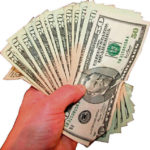The check is not in the mail.
But that big coronavirus stimulus check — up to $1,200 for singles, $2,400 for married couples and an extra $500 for each qualified child — might be in your bank account if the IRS has direct deposit information on you.
Some families will have to tap it for immediate needs like putting food on the table, paying past due bills or making a needed car repair; others may have more flexibility. But experts say regardless of your personal situation, it’s wise to chart priorities in advance.
Elaine Luther is a professor who teaches tax accounting and business communications at Point Park University and represents clients before the IRS as an enrolled agent. She and Todd Christensen, an author and personal finance educator with nonprofit credit counseling site, MoneyFit.org, agreed that personal needs should be addressed first.
“Using it to stabilize your household will minimize your need to turn to credit cards or payday loans,” Christensen said.
For many, the stimulus checks can’t come a moment too soon. A recent survey by Bankrate.com suggested the stimulus checks won’t cover basic costs for nearly a third of Americans for more than a month.
“For lower-income people, I’d say after meeting basic needs, take the money that is left over and open a checking account, if you don’t have one. Then you won’t have to pay for check-cashing services and money orders,” Luther said.
Christensen and Luther said trying to set aside some portion of the stimulus for an emergency fund — say $400 for tires or an emergency repair — is a wise move.
Beyond the basics, priorities may vary, based on the age of recipients.
“I’d love to say by their 40s or 50s, people don’t have debt, but that’s not always the case. If you have a lot of credit card debt, I’d look at paying down some of the high-interest debt,” Christensen said. Paying off that debt early can translate into significant savings on interest.
Luther suggested paying down credit card debt in instances where consumers are approaching their limits. “Because you need those credit cards. Right now, that’s about the only thing you can use to make a lot of purchases,” she said.
She advised against using stimulus money to pay off student debt, noting that the Department of Education has agreed to temporarily forgo payments without charging interest and may make additional allowances.
Luther said she’s planning to spend some of her stimulus check supporting local businesses. Buying into a local crop share or farm share is a great way to put food on the table and support local agriculture, she said. Ordering from local bookstores, rather than Amazon, or buying takeout from locally owned restaurants are other options some might want to consider.
Christensen suggested families with older children might want to take “a couple hundred dollars” and invest it to help them jump-start a small business.
And finally, he recommended setting aside 10 percent of any stimulus money for fun, a new purchase, a piece of home decor or a donation to a friend in need.
“If we can just spend a small portion on something fun, we can release some tensions and feel that we’re enjoying it, but also using appropriately,” he said.
In the best of all worlds, consumers will see the stimulus checks the federal government is forwarding to their accounts, but there are a couple of scenarios where they might not.
Although stimulus checks are exempt from state and federal taxes, they are still subject to garnishment for back child support. And a recent report in The American Prospect confirmed Congress did not shield the payments from debt collection.
That means banks could seize the money to pay off debts.
Jan Kruse of the National Consumer Law Center called that oversight “a travesty.”
The first 80 million checks were sent to direct deposit accounts this week. Additional payments will be deposited in the coming days. Checks are scheduled to begin hitting the mail in early May.
The IRS on Wednesday activated Get My Payment, a tool on its website to allow consumers to provide direct deposit information to hasten the distribution of the stimulus checks or to track the status of them.













